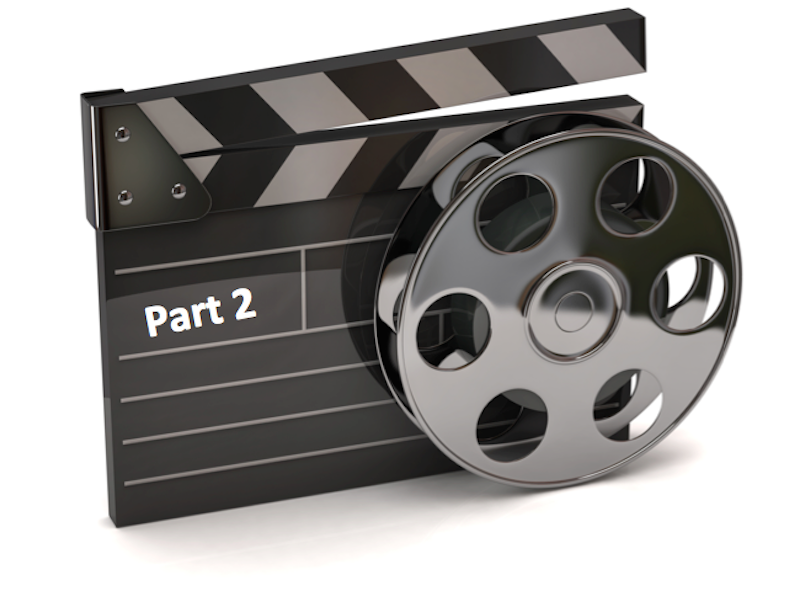How to Make the Perfect Demo Reel II.

In this continuation of our two-part article, the experts chime in with tips about music, editing, and communicating before and after you send your video.
Music
Our experts suggested these tips for scoring your demo video, but we think they also apply to scoring your whole act.
1. Edit to the music. If you’re sending video of your complete act, include live sound, so the viewer can hear how you relate to your music and how your audience relates to you. But if you’re sending samples or a montage of your work, do not just overlay one music track that has nothing to do with the visuals. Maximize the impact of your video, and show off your professionalism by timing your video edits to correspond to changes in the music—always splice on the measure. This isn’t as hard as it sounds. In fact, many video editing software programs include an option to do this automatically. It makes a big difference.
2. Don’t use copyrighted music without permission. YouTube may block your video altogether, but even if you squeeze by, you’re sending agents the wrong message by breaking the law. Ideally, you’ll want to commission original music so that it’s unique to your act, but an easier option is to use royalty-free music, which you can find on websites such as freestockmusic.com and audiojungle.com.
3. Avoid clichés. If you’ve seen another act perform to a particular song, don’t use that song! That includes not using anything from a Cirque du Soleil soundtrack! Also avoid using the season’s biggest hit; no matter how great a song is, agents will get tired of hearing it over and over. You won’t be the first artist to think of performing to Jeff Buckley’sHallelujah or Pharrell Williams’ Happy, so choose something else.

Editing
One of the most important choices you’ll make is whether to edit your video yourself or hire an editor. If you hire an editor, here are a few things to look out for:
1. Choose wisely. Before hiring a video editor, try to compare three to five options to compare. If you don’t know who to ask, you can use websites like Wooshii to gather proposals from professional editors. Ask to see portfolios of their work, and actually watch a few different videos so that you can decide whether they’ll be a good fit for you.
2. Write a contract. Even (or maybe especially) if you’re working with a friend or someone you know, it’s important to be clear about what is included and what your payment terms are. We recommend negotiating a fixed price, as hourly rates can easily exceed expectations, and a project rate helps protect you from risk.
3. Spell it out. Be sure the agreement specifies that you own the video and have the right to use it as you wish. You may choose to grant your videographer or editor permission to use the video to promote their work, but since it includes your likeness and intellectual property, spell out who can use it for what.
If you decide not to hire an outside editor, there are several user-friendly software programs that can help you edit your video yourself. Ask friends for recommendations, or try a few to see what works best for you. Here are a few common video editing programs you may wish to check out: Pinnacle, Adobe, Final Cut Pro, Apple iMovie, and Microoft MovieMaker. There are also online platforms, for example Wevideo.com, which allow you to upload your video to edit it online.

Communicating
Finally, here are a few suggestions on how to communicate with the casting agents:
1. Don’t contact an agent before sending your video. Your materials speak for themselves. You do not need to send an introductory e-mail or call just to ask whether you can send a video. Successful agents are busy; don’t waste their time.
2. Invite them to see you live. Monique Martin of New York City’s SummerStage program, says she screens videos to choose what shows to see, but she won’t book a show without seeing it live. Why? “Top three qualities I look for in an artist are artistic relevance, skill and audience engagement,” she explains. “I want to see your ability to move an audience through some level of transformation.”
3. Keep in touch. Serge Côté from Franco Dragone Entertainment Group says, “Timing is everything. You can be the best in the world, but if you don’t fit the role, you have no chance.” Most of the big companies will let you know if you have a chance. Cirque du Soleil and Franco Dragone, for example, both contact all applicants who pass their initial screen (if you don’t hear back within a month, they’re not interested). If you get that letter, you’re in the database. From then on, Serge says, “send news from time to time about what is happening to you professionally.”
Special thanks to our circus industry experts! Serge Côté manages casting issues at Franco Dragone Entertainment Group (2012-2014) and previously coordinated the casting department (2008-2009). From 1991-2004, he served as information coordinator for Cirque du Soleil, where he was behind the process of managing data on artists and developed an award-winning casting software program. He also writes novels, presents shows and consults for arts organizations in his native Quebec and in Ontario, Canada. Monique Martin is programming director for the New York City Parks Foundation, which produces SummerStage in over 100 parks city wide, presenting over 1,200 multi-genre programs reaching annual audiences of 600,000. Monique provides vision and expertise in presenting relevant, fresh, and thoughtful programming to New York City communities. Monique has served on various national advisory committees, boards and panels, including Association of Performing Arts Presenters, Ford Foundation, and Women of Color in the Arts. Monique is an ardent facilitator of collaborations across cultures and genres that build lasting partnerships and foster cross-cultural exchange.
Related content: How to Make the Perfect Demo Reel Part 1.
Editor's Note: At StageLync, an international platform for the performing arts, we celebrate the diversity of our writers' backgrounds. We recognize and support their choice to use either American or British English in their articles, respecting their individual preferences and origins. This policy allows us to embrace a wide range of linguistic expressions, enriching our content and reflecting the global nature of our community.
🎧 Join us on the StageLync Podcast for inspiring stories from the world of performing arts! Tune in to hear from the creative minds who bring magic to life, both onstage and behind the scenes. 🎙️ 👉 Listen now!
